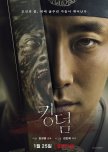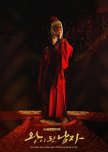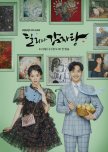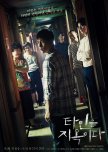
This review may contain spoilers
Great concept, ultimately poor execution
At the outset this drama is a hilarious anti-TWILIGHT but halfway through the writers drop anything funny and past episode 12 they are phoning it in. I think if this had been a 10-12 episode drama they would have had less opportunity to muddle around and get lost. They would have executed on some of their concepts better too.Joo In-hae being the reincarnation of Seon Woo-hyeol’s first love (and thus being able to open his coffin, having eyes that reflected him, etc.) while Na Hae-won is a dead ringer for his first love but ultimately a red herring was actually a great concept but was not fully elaborated on or sufficiently explored. Many of the other people I was watching with didn’t pick up on it.
Hae-won, Do-sik, and Man-hwi competing with each other because of their conflicting desires and goals with regards to In-hae and Woo-hyeol could have been done in a much more thoughtful and interesting way too. Instead it was rushed at the end.
And why couldn’t a smart woman like In-hae have defused her neighbors’ complaints about a vampire in the mansion by just saying “come on now, we all know that vampires aren’t real, what’s with you people?” I guess that would have required the writers to remember that their show was supposed to be funny.
Was this review helpful to you?

Short, super-wholesome, and a good team in front of and behind the camera
Full disclosure: I normally don't watch variety shows but I watched this because Yeo Jin-goo is in it. But by the end I was charmed by all the participants in this cooperative reality show: Ha Jung-woo, Joo Ji-hoon, and MINHO too. There were a lot of touching moments of bromance as well as mentorship from the older actors (Jung-woo and Ji-hoon) to the younger ones.The crew also really set the cast up for success. When their initial ideas for the formula of, e.g., the variety show challenges didn't work out so well, they made changes on the fly and took lessons learned to get it to work out next time. Everyone had good humor and was flexible. You can tell everyone involved was trying to make it a good experience for each other (so different from American reality shows).
Also if you are a big fan of any of the cast members, you will learn a lot about them, their attitudes, and their histories from this show, so it's good to watch for that reason alone.
Was this review helpful to you?

This review may contain spoilers
Turns out zombies and sageuks go well together (Review for both S1 and S2)
“Do a zombie series but set it in 17th-century Joseon” really sounds like a clever conceit at best and that’s what I thought when I started watching KINGDOM, but that’s not what it is at all. It turns out that playing completely straight as an old-school zombie flick while deconstructing - or maybe…dissecting? - a sageuk (Korean historical deama) totally works.If you are not a big fan of sageuks or familiar with the conventions of the genre, this totally works as a zombie flick. As a general rule of zombie flicks, human selfishness, denial, societal dysfunction, and corruption play a role in initiating and spreading the zombie outbreak. Human cooperation, ingenuity, resourcefulness, selflessness, and courage end the outbreak. This is how it works in KINGDOM, too, appropriate to the time, place, and culture. The more things change, the more they remain the same, including how people respond to a zombie outbreak. The only problem is that the drama is a little too fixated on how the zombies “work” well past the point where this is interesting or salient.
If you *are* a fan of sageuks KINGDOM is extra-special. Sageuks are about resolving situations of rampant corruption and political dysfunction: zombies, meanwhile, are metaphors for corruption and dysfunction reaching a crisis point. The best sageuks acknowledge the inherent evil and dysfunction of a society ruled by hereditary monarchs and aristocrats, while the best zombie flicks never let the audience forget that the zombies may be infectious flesh-eating hordes, but humans are the real monsters.
KINGDOM understands the assignment: the first zombie the audience sees, Patient Zero of the outbreak, is the King, put in that state to serve the ambitions of corrupt nobles. The climactic battle in the palace that occurs near the end of so many sageuks? It’s a big fight with zombies that wipes out all the corrupt nobles and their lackeys.
KINGDOM will make you go from “Zombies in a sageuk? Really?” to “Yes, zombies in a sageuk, of course!”
Was this review helpful to you?

This review may contain spoilers
A rich seam of rewatch value
I am a big fan of the sageuk (Korean historical drama) genre in general but this is one of my favorite dramas in the genre and, well, of all the Kdramas I have watched. I come back and rewatch it periodically, partly because I am a super fan of Yeo Jin-goo (who plays the dual roles of the king and Ha-seon the clown so adeptly), but also for lots of other reasons. The rest of the cast, the writing, the direction, the production, the soundtrack, everything is very nearly flawless. Except the ending which almost everyone seems to have some issues with.One of the things that keeps me coming back is that the characters are so well-realized through a combination of writing and acting that knowing more about them gives certain lines and actions more significance on rewatching, so I always pick up on something I didn’t notice before.
Nobody in this drama is one-dimensional. Shin Chi-soo, the Left State Councillor, bears the scars of war, clawed his way to the top, and is just doing what he thinks he needs to do to protect himself, because he’s seen what happens to people without power. The Dowager Queen is doing the only thing she can to get justice for her little son’s unjust murder. The king Ha-seon doubles for and eventually replaces was despised by his own father from the day he was born for something that wasn’t his own fault, then used, manipulated, and addicted to drugs by people who should have been his most trusted advisors - how could he have kept his sanity or stayed a decent person in the face of that? And the Chief Royal Secretary, oh boy. Although Shin Chi-soo is a terrible person, he is absolutely right about the Chief Royal Secretary.
There’s also something uncomfortable inherent in these characters and motivations: the usual sageuk trope of setting everything right by clearing all the bad guys out of positions of power won’t work here. The environment of the palace is bad and corrupting not because there are bad people in it, but because it’s the nature of the palace and the incentives in it. People will lose their morals, lose their humanity, commit terrible acts, and perpetuate a cycle of violence and suffering that engulfs both people in positions of power and, unfortunately, the innocent people they have power over.
Yes, it’s depressing! But it’s not wrong. Hereditady aristocracy and monarchy are a terrible way to run a country.
Was this review helpful to you?

This Drama Uses Every Element Deliciously
“Dali” puts every element of itself to good use, and absolutely nothing is wasted. The design of a character’s office or home tells you a lot about who they are and what’s important to them (as befits a show where the significance of art and emotional connections to art are running themes). Subtle shifts in a character’s wardrobe indicate how they’re changing as the story progresses. Some object that seems like a joke or a gag always turns out to be really important later. Most of the characters aren’t as simple as they seem to be when you first meet them, and your opinion of them will completely change by the end of the drama.There’s also something from the first episode that you might think the scriptwriter totally forgot, but don’t worry, it comes up in the last episode. The attention to detail is just astounding.
This drama also does something fairly unusual with camera work by using split screens instead of cutaways and reaction shots in order to capture the facial expressions and reactions of everyone involved in a scene. So it’s a bit more like a live performance where you can see everything happening at once.
It’s definitely worth a rewatch: it’s so richly layered that you’ll definitely pick up some things on a second viewing that you didn’t notice before.
Was this review helpful to you?

A showcase for the actors/characters
I mostly started watching this drama because “legal drama, but a sageuk” sounded like kind of an interesting concept. At the time I knew nothing about Wu Do-hwan or Bona at all.But the thing about the whole concept of the drama is that, well, it’s actually “film noir, but a sageuk,” and it’s kind of serviceable but not really remarkable (although it’s not bad, either). The things that really make this drama worth watching are 1. Wu Do-hwan’s megawatt star charisma (and abs LOL) 2. Bona and Wu Do-hwan’s smoldering chemistry 3. Cha Hak-yeon’s intense but subtle performance as the second male lead.
I also have to give points to Chun Ho-jin who approaches the role of chief antagonist as a kind of casual, affable supervillain, nonchalantly manufacturing forbidden blue-and-white pottery in his own kiln for his bowing and scraping minions.
I’m also in the middle of rewatching this drama and it’s definitely worth seeing a second time: there are lots of details you’ll appreciate with a certain foreknowledge of the plot and characters.
Was this review helpful to you?

This review may contain spoilers
A perspective on DOCTOR CHA from a mother, retired doctor, and connoisseur of medical dramas
The "mother, retired doctor, and connoisseur of medical dramas" is my mother, not me, but she isn't on MDL and her life experience means she has a much more interesting take on this drama than probably 90% of the people who have seen it, including me.My mom spent almost 4 decades working in hospitals, managed care facilities, outpatient clinics, you name it. She also raised multiple kids! She gave birth to her first child during her residency. Mom has also watched every American medical show ever produced in its entirety from E.R. to SCRUBS to GREY'S ANATOMY.
She really loves DOCTOR CHA. First she says that the show got the technical/medical details right (hats off to not just the writer and actors but also the Netflix subtitler for nailing it). The depictions of pressures on doctors and residents, the messiness of their lives, the "old boys' network," and the ageism towards Cha Jeong-suk really resonated with her (my mother really felt that later on in her career).
Mom also appreciated how nobody in the drama was one-dimensional: Choi Seung-hee wasn't just some homewrecker, she was trying to "have it all" when that option wasn't available to her because of the man she got involved with, the society she lived in, or both. Roy Kim is not a straight-up hero, he has some of the same Main Character Syndrome as Seo In-ho and has to work on it. Seo In-ho is essentially the villain of the narrative but he's still a person, just a person who's 70-90% of everyone else's problems including his own because of his arrogance and poor choices. He's a pitiable and often laughable hot mess of a person - which comes across because of Kim Byung-chul's skills as a physical comedian (my mother found him very funny).
So what did mom think of the ending, which so many people didn't like? Well, in the end, Cha Jeong-suk is doing the work she wants to do. Her kids are thriving and she has a good relationship with them. She's in reasonably good health after an organ transplant and two brushes with death. My mom thought that was a pretty satisfying ending, all things considered.
Was this review helpful to you?

This review may contain spoilers
Why the ML Can’t See Red Flags
I am only partway through this drama but it’s dawned on me that part of the overall horror and a big part of what keeps the plot going is that Jong-woo, the ML, doesn’t have a healthy instinct for self-preservation. if he did he would have left Eden Boarding House in 5 minutes even though his rolling suitcase was broken.It’s not that he’s stupid or oblivious or anything like that. We do see early on that he has a knack for making not-great choices. The big problem is that he’s just so accustomed to dealing with dysfunction, humiliation, and outright abuse in his day-to-day life and just brushing away all the ill feeling it gives him that he can no longer recognize when he’s in a dangerous situation and react appropriately.
Look at how he gets treated by the people in his workplace and elsewhere: he’s told he’s too sensitive, has his emotions invalidated, and even gets told to smile more! A lot of women are probably all too familiar with this kind of treatment. Jong-woo has internalized a lot of it too. He keeps telling himself to ignore really bizarre and awful things at the boarding house, insisting to himself that he’s being ridiculous, so by the time he realizes how bad the situation really is, it’s almost too late.
It’s this dynamic that makes the progression of the story so natural and adds to the subtle sense of horror/dread.
Was this review helpful to you?









